Luke Cage Levels Up: Season Two Is a 13-Hour Mic Drop
Photo: David Lee/Netflix
I actually got trolled, like legitski online-harassed, for saying that other than Jessica Jones—and specifically Krysten Ritter’s performance therein—the Marvel Netflix Industrial Entertainment Complex ranged from “meh” (Luke Cage, other than Mike Colter also acquitting himself pretty brilliantly in the title role) to “Dear God, another dreary, plodding death march through Stan Lee’s limbic system? When will it be over?” (Sorry, The Defenders.)
Trolled!
But I stand by it. Luke Cage Season One had cool moments, and several very good performances (by actors and guest musicians alike). It also had a whole lot of loose writing, draggy direction, and, yes, a level of symbolic unsubtlety you cannot excuse with the “because comics” thing. It wasn’t The Incredible Hulk. It was for grownups. And grownups are (or should be) capable of extracting bigger-picture stuff from a screen conceit without being whacked in the head with Black Masculinity Tropes 101, “Check it: we’re timely!” police brutality subplots and a brother (both meanings) who spouts scripture in a way that I bet had Samuel Jackson hanging his head. There were flashes of something wonderful. But they were buried in a big pile of “duh,” at least for this viewer.
Halfway through the first episode of Season Two, I started to wonder if I just hadn’t been paying attention the first time, but as I watched it became clear that it was the show that had changed, not the viewer. I don’t have too many ways to put this that wouldn’t land all my loose change in the Swear Jar, but… let’s just say someone clearly changed the snacks in the writers’ room over there, because to say Luke Cage has upped its game for its second season is putting it really mildly. I don’t remember the last time I saw a TV show take this huge of an artistic leap from one season to the next.
-

-

-

-

-

-

-

-

-

-

-

-

-

-

-

-

-

-

-

-

-

-

-

-

-

-

-

-

-

-

-

-

-

-

-

-

-

-

-

-








































